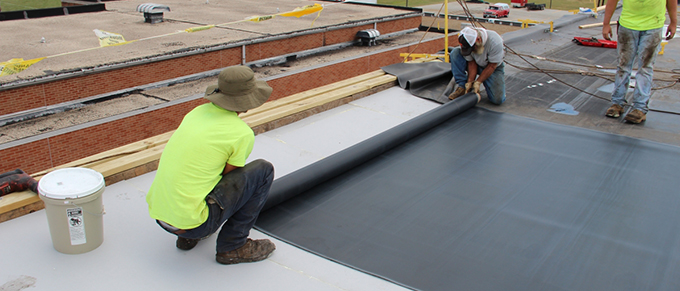
Commercial roofs are made to withstand varying weather elements. Depending on the roofing materials used, a well-maintained commercial roof should last anywhere from 20 to 30 years. However, certain external factors can affect the wear and tear on the roof, leading to leaks and damage from materials coming loose. While simple repairs can solve some problems, it sometimes makes more sense to replace the roof.
Is it always necessary to replace the entire roof? Let’s examine a few factors.
Leaking
It is quite possible that a leak is limited to a particular section of the roof. For example, loose flashing can be addressed with a simple repair. If you have leaks in several sections of your building, your roof might be too weak to patch. With extensive water damage, total replacement will be the best option to avoid ongoing and costly repairs.
Incorrect Materials
If a roof is failing from the improper installation of materials, or if the wrong materials were selected in the first place, it most likely will have to be replaced in its entirety. When the wrong materials are on the roof, patching and repairing the bad spots is not an acceptable option for the long-term performance of your roof. As long as you are doing a complete replacement, you might be able to take advantage of updated roofing specifications that feature newer, more efficient roofing materials.
Alternatives
If the majority of your roof is in good condition, total replacement will not be necessary. You may want to consider doing replacement over high-priority areas, such as over expensive manufacturing equipment or office space, and hold off on the balance of the roof using certain preventive measures such as regularly scheduled inspections.
Cost
If 25% or more of the roof is damaged, and the owner is looking for a long-term solution, it’s best to do an entire replacement. The maintenance expenses the owner is likely to incur for doing only a partial replacement won’t make economic sense in the long-run.
The bottom line: Even when you have only sections of your roof showing signs of damage, it could be less expensive to do a full replacement while the equipment and crew is on-site than waiting a few years to complete the job.
RELATED BLOG: FLAT ROOF REPAIR TIPS
What to Do
Building Owner: Take note of any problems after a heavy rain. Do you have leaks or moisture around areas of penetration, the ceiling or interior walls? Obviously, multiple leaks are a sign of a more serious problem.
Contractor: Schedule an inspection, and make sure your contractor conducts a thorough investigation of your flat roof. This should include flashings, seams and all attachment points. Any cracking or crumbling near roof joints and corners should be noted. The contractor should be looking at overall deterioration, leaks, punctures and premature aging.
The question of whether to do a partial or full commercial roof replacement should be answered with the aid of experienced commercial roofing professionals. They will be able to tell you how much more damage your commercial roof can withstand.
To learn more about flat roof replacement and repair in Cleveland, Ohio, simply fill out the form on this page and a member of our team will be in touch. Or, you may call us at 440.946.2233.
